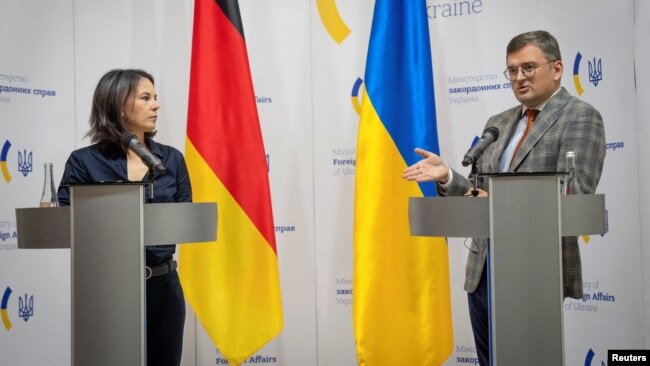The Biden administration is reportedly considering supplying Ukraine with longer-range missiles that are packed with cluster bombs and that could cause significant damage deeper within Russian-occupied territory, according to four U.S. officials.
After seeing the success of cluster munitions delivered in 155 mm artillery rounds in recent months, the U.S. is considering shipping Army Tactical Missile Systems (ATACMS) that can fly up to 306 kilometers and Guided Multiple Launch Rocket System (GMLRS) missiles that have a 72-kilometer range and are packed with cluster bombs, according to Reuters news agency. The GMLRS rocket system would be able to disperse up to 404 cluster munitions. Ukraine has had a version of the GMLRS system in its arsenal for months.
The Biden administration has for months been mulling over the supply of ATACMS, fearing their shipment to Ukraine would be perceived as an overly aggressive move against Russia.
With Ukraine’s counteroffensive against Russian forces showing signs of progress, however, Washington is keen to boost the Ukrainian military at a vital moment, two sources told Reuters.
Ukraine’s military intelligence said Monday that Ukrainian forces had retaken control of several offshore gas and oil drilling platforms near Crimea.
It said on Telegram that the operation included Ukrainian special forces on boats who damaged a Russian Su-30 fighter jet and captured helicopter ammunition and radar equipment.
Ukraine’s Ministry of Defense said Russia had occupied the platforms since 2015 and had used them for military purposes.
More territory gained
Ukraine also said on Monday that its troops had regained more territory on the eastern and southern fronts in the past week of its counteroffensive against Russian forces.
Washington continues to assess the progress Ukrainian forces are making on the ground, and Russia’s overall strategic goals have failed in Ukraine, said State Department spokesperson Matthew Miller during a press briefing Monday,
“Their goals were to take Kyiv, to take the majority, if not all of the country, to overthrow the democratically elected government of Ukraine. In all of those things they have failed,” he said.
Miller noted that the Ukrainians have taken back around 50% of the country that Russia occupied at the height of its full-scale invasion.
The State Department spokesman said that one indication of Russia’s difficulties in sustaining its military effort is [Russian President Vladimir] Putin “traveling across his own country, hat in hand, to beg [North Korean leader] Kim Jong Un for military assistance.”
The meeting between the two leaders is expected to take place as early as Tuesday in Vladivostok, Russia.
“We are going to monitor very closely the outcome of this meeting,” Miller said. “I would remind both countries that any transfer of arms from North Korea to Russia would be in violation of multiple United Nations Security Council resolutions, and we aggressively, of course, have enforced our sanctions against entities that fund Russia’s war effort. We will continue to enforce those sanctions and will not hesitate to enforce new sanctions if appropriate.”
German aid
German Defense Minister Boris Pistorius said Monday that Berlin would not necessarily supply Kyiv with Taurus cruise missiles simply because the U.S. might decide to send ATACMS long-range missiles to the war-torn country.
“There is no automatism in this war,” Pistorius told reporters on the sidelines of a visit to Cologne, adding that Germany was not yet able to decide whether to provide Ukraine with Taurus missiles.

Kyiv has been pushing Berlin to supply it with the missiles, which are launched by fighter jets and have a range of more than 500 kilometers.
During a Monday meeting with his German counterpart, Annalena Baerbock, Ukrainian Foreign Minister Dmytro Kuleba announced that he requested the delivery of Taurus cruise missiles from Germany as soon as possible.
“You will do it anyway — it’s just a matter of time — and I don’t understand why we are wasting time,” Kuleba said in response to a question at a joint press conference with Baerbock in Kyiv.
Kuleba noted that Ukraine, a major grain producer and exporter, needed more protection for its ports after Russia stepped up airstrikes on grain export infrastructure.
The German foreign minister said that Germany would provide an additional $21.44 million in humanitarian aid, bringing Berlin’s additional aid to $408 million this year.
“Russia’s perfidious goal is to starve the people again this winter and to let them freeze to death,” she warned.
Baerbock also expressed her country’s support for Ukraine’s entrance into the European Union but added that Kyiv has to do more to combat graft.
“Reform results in the areas of judicial reform and media legislation are already impressive. But there is still a long way to go in the implementation of the anti-oligarch law and the fight against corruption,” Baerbock said.
Source: VOA News


